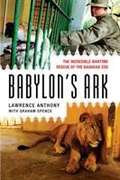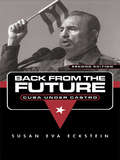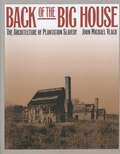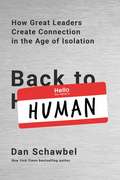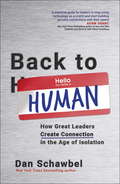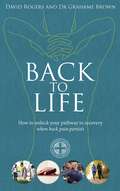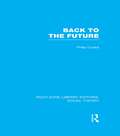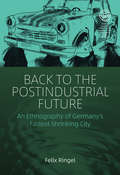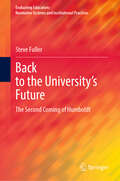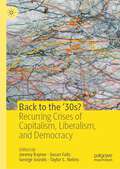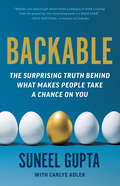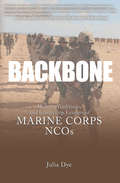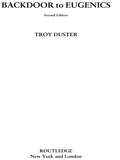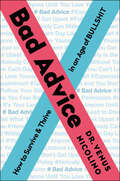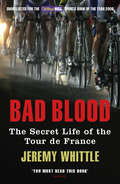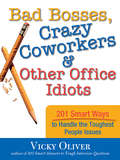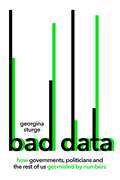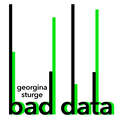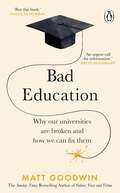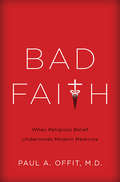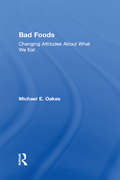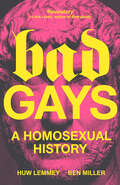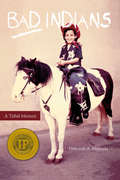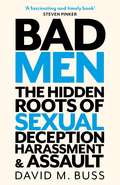- Table View
- List View
Babylon's Ark: The Incredible Wartime Rescue of the Baghdad Zoo
by Lawrence AnthonyThe astonishing story of the soldiers, conservationists, and ordinary Iraqis who united to save the animals of the Baghdad Zoo. When the Iraq war began, conservationist Lawrence Anthony could think of only one thing: the fate of the Baghdad Zoo, caught in the crossfire at the heart of the city. Once Anthony entered Iraq he discovered that hostilities and uncontrolled looting had devastated the zoo and its animals. Working with members of the zoo staff and a few compassionate U.S. soldiers, he defended the zoo, bartered for food on war-torn streets, and scoured bombed palaces for desperately needed supplies. This book chronicles Anthony's hair-raising efforts to save a pride of Saddam's lions, close a deplorable black-market zoo, run ostriches through shoot-to-kill checkpoints, and rescue the dictator's personal herd of Thoroughbred Arabian horses. A tale of the selfless courage and humanity of a few men and women living dangerously for all the right reasons, the book is an inspiring and uplifting true-life adventure of individuals on both sides working together for the sake of magnificent wildlife caught in a war zone.
Back From the Future: Cuba Under Castro
by Susan Eva EcksteinThis book has long been regarded as the definitive history of Castro's communist regime, beginning in 1959 through the 1990s. This updated, second edition contains a new epilogue by the author that covers the last decade, including such newsworthy events as the Elian Gonzalez controversy, the growing immigrant community of Cuban-Americans in Florida, the role of Cuban-Americans in the 2000 presidential election, the withering U.S. sales embargo and the inevitable transition of power now that Castro is in his mid-70s.
Back of the Big House: The Architecture of Plantation Slavery
by John Michael VlachBehind the "Big Houses" of the antebellum South existed a different world, socially and architecturally, where slaves lived and worked. John Michael Vlach explores the structures and spaces that formed the slaves' environment. Through photographs and the words of former slaves, he portrays the plantation landscape from the slaves' own point of view. The plantation landscape was chiefly the creation of slaveholders, but Vlach argues convincingly that slaves imbued this landscape with their own meanings. Their subtle acts of appropriation constituted one of the more effective strategies of slave resistance and one that provided a locus for the formation of a distinctive African American culture in the South. Vlach has chosen more than 200 photographs and drawings from the Historic American Buildings Survey--an archive that has been mined many times for its images of the planters' residences but rarely for those of slave dwellings. In a dramatic photographic tour, Vlach leads readers through kitchens, smokehouses, dairies, barns and stables, and overseers' houses, finally reaching the slave quarters. To evoke a firsthand sense of what it was like to live and work in these spaces, he includes excerpts from the moving testimonies of former slaves drawn from the Federal Writers' Project collections.
Back to Human: How Great Leaders Create Connection in the Age of Isolation
by Dan SchawbelBack to Human explains how a more socially connected workforce creates greater fulfillment, productivity, and engagement while preventing burnout and turnover. New York Times bestselling author Dan Schawbel guides the next generation of leaders to create a workplace where teammates feel genuinely connected, engaged, and empowered to grow strong interpersonal skills rather than relying on technology. Based on Schawbel's exclusive research studies--featuring the perspectives of over 2,000 managers and employees across different age groups and from the US, UK, China, India, Brazil and other countries--Back to Human reveals why electronic and virtual communication, though vital and useful, actually contributes to a stronger sense of isolation at work than ever before. The corporate cultures we are experiencing right now need to change, and Schawbel offers a new leadership model featuring The Work-Life Balance Myth (we should consider work-life integration instead, which creates more synergies between all areas of your life and puts you in control of how you allocate your time), Shared Learning (how sharing knowledge allows you to stay relevant despite industry disruptions), and more. The book includes:Interviews with 100 leaders from notable companies including Facebook, Honeywell, HBO, Starbucks, General Mills, GE, Nike, American Express, Four Seasons, Walmart, TIME, LinkedIn, and The U.S. Air Force.A self-assessment called "The Work Connectivity Index" that measures that strength of team relationships.Exercises, examples and activities that readers can work on individually, or as a team, which will help them improve their leadership skills.Tips and strategies on how to increase personal productivity, be more collaborative and become more fulfilled at work.
Back to Human: How Great Leaders Create Connection in the Age of Isolation
by Dan SchawbelBack to Human explains how a more socially connected workforce creates greater fulfillment, productivity, and engagement while preventing burnout and turnover. New York Times bestselling author Dan Schawbel guides the next generation of leaders to create a workplace where teammates feel genuinely connected, engaged, and empowered to grow strong interpersonal skills rather than relying on technology. Based on Schawbel's exclusive research studies--featuring the perspectives of over 2,000 managers and employees across different age groups and from the US, UK, China, India, Brazil and other countries - Back to Human reveals why electronic and virtual communication, though vital and useful, actually contributes to a stronger sense of isolation at work than ever before. The corporate cultures we are experiencing right now need to change, and Schawbel offers a new leadership model featuring The Work-Life Balance Myth (we should consider work-life integration instead, which creates more synergies between all areas of your life and puts you in control of how you allocate your time), Shared Learning (how sharing knowledge allows you to stay relevant despite industry disruptions), and more. The book includes:-Interviews with 100 leaders from notable companies including Facebook, Honeywell, HBO, Starbucks, General Mills, GE, Nike, American Express, Four Seasons, Walmart, TIME, LinkedIn, and The U.S. Air Force.-A self-assessment called "The Work Connectivity Index" that measures that strength of team relationships.-Exercises, examples and activities that readers can work on individually, or as a team, which will help them improve their leadership skills.-Tips and strategies on how to increase personal productivity, be more collaborative and become more fulfilled at work.
Back to Life: How to unlock your pathway to recovery (when back pain persists)
by David Rogers Dr Grahame BrownBack pain is very hard (often impossible) to diagnose and to specify, hence heavy painkillers are thrown at people. But the only way to beat the pain is to understand it. Based on cutting-edge research into back pain and the psychology of pain itself, David Rogers and Grahame Brown have set up the Functional Restoration Service at the Royal Orthopaedic Hospital in Birmingham – the UK’s leading centre for back pain. Here they have developed the pioneering BIOPSYCHOSOCIAL approach: BIO – How your body processes pain; what physical triggers you have and why; where your body holds painPSYCHO – where your pain is coming from; what exactly your pain is; the power of your mind to deal with and stop painSOCIAL – all the environmental factors that will contribute to your back pain, and how, why and when to change themBased on this revolutionary and already hugely successful approach, Back to Life offers a whole new way of dealing with back pain: - Understand the psychology of pain- Debunk the myths- Find the source of your pain- Manage your pain – including all the emotions and anxiety that go with it- Master exercises and stretches- Identify and solve the social factors- Get lasting relief
Back to the Future: Modernity, Postmodernity and Locality (Routledge Library Editions: Social Theory)
by Philip CookeIs modernity being replaced by an opposite culture of postmodernity, or is postmodernism simply an internal critique of modernist culture? This key question is central to this stimulating book which explores the transformations taking place in social life, cultural preferences, economic organization and political attitudes, particularly in the context of the contemporary city as a lived or written experience. This book contains accounts of the development of modern ways of life and their erosion in the 20th century. The author argues that a whole set of modern institutions, from the corporation to the novel, are being exposed to internal critique and external competition. As a result, new ways of seeing and thinking are moving us into what some observers see as postmodern culture. However, these tendencies may in fact be the continuation of modernity by other means.
Back to the Postindustrial Future: An Ethnography of Germany's Fastest-Shrinking City (EASA Series #33)
by Felix RingelHow does an urban community come to terms with the loss of its future? The former socialist model city of Hoyerswerda is an extreme case of a declining postindustrial city. Built to serve the GDR coal industry, it lost over half its population to outmigration after German reunification and the coal industry crisis, leading to the large-scale deconstruction of its cityscape. This book tells the story of its inhabitants, now forced to reconsider their futures. Building on recent theoretical work, it advances a new anthropological approach to time, allowing us to investigate the postindustrial era and the futures it has supposedly lost.
Back to the Roots: Memory, Inequality, and Urban Agriculture (Nature, Society, and Culture)
by Sara ShostakAcross the Commonwealth of Massachusetts, urban farmers and gardeners are reclaiming cultural traditions linked to food, farming, and health; challenging systemic racism and injustice in the food system; demanding greater community control of resources in marginalized neighborhoods; and moving towards their visions of more equitable urban futures. As part of this urgent work, urban farmers and gardeners encounter and reckon with both the cultural meanings and material legacies of the past. Drawing on their narratives, Back to the Roots demonstrates that urban agriculture is a critical domain for explorations of, and challenges to, the long standing inequalities that shape both the materiality of cities and the bodies of their inhabitants.
Back to the University's Future: The Second Coming of Humboldt (Evaluating Education: Normative Systems and Institutional Practices)
by Steve FullerThis volume addresses the central question facing the future of higher education around the world, whether and why universities need to exist at all. This book accepts the question’s premise: It is not clear that the university is any longer needed as an institution -- that is, unless its defenders recover what had made the university the revolutionary institution that over the past two centuries has not only defined the shape of modern systematic inquiry but also the distinctiveness of the societies that have housed them. In short, what is required is a reanimation of the spirit of Wilhelm von Humboldt for our times; hence the book's title and subtitle. Humboldt was responsible for relaunching the university as the vanguard institution of 'Enlightenment' to which we continue to pay lip service – and sometimes not much more than that. Admittedly, the task of relaunching Humboldt today is made difficult because many of the concrete achievements associated with the Humboldtian university – not least academic disciplines and nation-states – are increasingly seen as problematic if not obsolete. However, the global reach of the Humboldtian vision in its 19th century and 20th century heyday offers hope that it may be recovered in the 21st century. The book focuses on the performative character of the academic vocation, what Humboldt memorably characterized as the 'unity of research and teaching' in the same person, a role model for students and society at large. The book's seven chapters develop this theme in a historically and philosophically nuanced way in terms of the Humboldtian vision of knowledge, sense of free expression and critical judgement, and commitment to translation and publicity.
Back to the ‘30s?: Recurring Crises of Capitalism, Liberalism, and Democracy
by Susan Falls Jeremy Rayner George Souvlis Taylor C. NelmsThe essays in this volume address the question: what does it mean to understand the contemporary moment in light of the 1930s? In the aftermath of the worst economic crisis since the Great Depression, and facing a dramatic rise of right wing, authoritarian politics across the globe, the events of the 1930s have acquired a renewed relevance. Contributions from a diverse, interdisciplinary group of scholars address the relationship between these historical moments in various geographical contexts, from Asia-Pacific to Europe to the Americas, while probing an array of thematic questions—the meaning of populism and fascism, the contradictions of constitutional liberalism and “militant democracy,” long cycles and crisis tendencies in capitalism, the gendering and racialization of right wing movements, and the cultural and class politics of emancipatory struggles. Uncovering continuity as well as change and repetition in the midst of transition, Back to the 30s? enriches our ability to use the past to evaluate the challenges, dangers, and promises of the present.
Backable: The Surprising Truth Behind What Makes People Take a Chance on You
by Suneel GuptaA groundbreaking book that boldly claims the key to success in business is not talent, connections, or ideas, but the ability to persuade people to take a chance on potential. No one ever makes it alone. But how come some people can get investors to believe in their ideas while others—sometimes with even better ideas—fall flat? What is it about certain people that make us want to take a bet on them? What is it that makes them backable? As it turns out, it's not what you think. Backability is not driven by having the best experience, the finest pedigree, or the most innovative ideas. In fact, many highly successful people are backed long before they are qualified. We tend to view these people as lucky. But the decision to back them is neither an accident nor a mistake, and rarely the result of good luck. Drawing from his own business experience, countless interviews with some of tech's biggest innovators, and compelling case studies of classic success stories like Howard Schultz and Elon Musk, Gupta breaks down the six qualities of backable people that get others to take a bet on them. Backable pulls back the curtain on the illusive x factor that some people just seem to have and instead offers concrete tools like crafting the right pitch and appropriately scaling a project's vision. Anyone from aspiring entrepreneurs to start up stars can master these skills and jumpstart their next big idea.
Backbone
by Julia DyeNoncommissioned officers stand as the backbone of the United States Marine Corps. The corps is among the most lasting institutions in America, though few understand what makes it so strong and how that understanding can be applied effectively in today's world. In this insightful and thoroughly researched book, Julia Dye explores the cadre of noncommissioned officers that make up the Marine Corps's system of small-unit leadership. To help us better understand what makes these extraordinary men and women such effective leaders, Dye examines the fourteen leadership traits embraced by every NCO. These qualities--including judgment, enthusiasm, determination, bearing, and unselfishness--are exemplified by men like Terry Anderson, the former Marine sergeant who spent nearly seven years as a hostage in Beirut, John Basilone, a hero of the Pacific front in World War II, and many others. To assemble this extraordinary chronicle, Dye interviewed Anderson and dozens of other marines, mining a trove of NCO heroes who comprise the Marine Corps's astonishing legacy, from its founding in 1775 to the present day.
Backdoor to Eugenics
by Troy DusterConsidered a classic in the field, Troy Duster's Backdoor to Eugenics was a groundbreaking book that grappled with the social and political implications of the new genetic technologies. Completely updated and revised, this work will be welcomed back into print as we struggle to understand the pros and cons of prenatal detection of birth defects; gene therapies; growth hormones; and substitute genetic answers to problems linked with such groups as Jews, Scandanavians, Native American, Arabs and African Americans. Duster's book has never been more timely.
Bad Advice: How to Survive & Thrive in an Age of Bullshit
by Dr. Venus NicolinoLos Angeles Times #1 BestsellerUSA Today Bestselling BookOver motivational messages? Sick AF of inspirational quotes? Done with the shiny happy bad advice that gets you nowhere? Well, heads up: you’re about to get a shitload of Good Advice.In Bad Advice, relationship expert Dr. Venus Nicolino—a.k.a. Dr. V—takes a blowtorch to the shrink-wrapped, “feel good” BS that passes for self-help these days. When you’re heartbroken, what do you hear? You can’t love anyone until you love yourself. When someone’s hurt you? Nobody can make you feel bad without your permission. When you’re just a little too positive? Expectations lead to disappointment. Pop culture noise gives Bad Advice the varnish of truthiness and inspiration. But it’s not truth; it’s not inspiration. It’s bullshit. And at its root, all Bad Advice operates off the same lie: Emotions are optional. In Bad Advice, Dr. V delivers a bracing truth serum, in the form of Good Advice—an antidote to the bullshit, from “Just Be Yourself” to “Live Each Day Like It’s Your Last,” that teaches you to live your life in a way that honors who you are, what you need, and how you feel.Smart and irreverent, Dr. V fuses the brains and insight of a nerdy Ph.D. with the heart of a doting Italian Mother and the artful profanity of a Philly trucker. Dr. V’s signature combination of humor, hard science, and heartmake Bad Advice an iconoclastic course-correction like no other. A fiercely sharp wake-up call that tackles some of self-help’s most damaging truisms, Bad Advice is a never shy guide to tapping into your full potential.
Bad Blood: The Secret Life of the Tour de France
by Jeremy WhittleEven the biggest cycling fan can one day wake up to find that he has lost his faith Bad Blood is the story of Jeremy Whittle's journey from unquestioning fan to Tour de France insider and confirmed sceptic. It's about broken friendships and a sport divided; about having to choose sides in the war against doping; about how galloping greed and corporate opportunism have led the Tour de France to the brink of destruction.Part personal memoir, part devastating exposé of a sport torn apart by drugs and scandal, Bad Blood is a love letter to one man's past, and a warning to cycling's future.‘Whatever you think about doping, you must read this book ... Well-balanced, considered, compelling’ RouleurShortlisted for the 2008 William Hill Sports Book of the Year
Bad Bosses, Crazy Coworkers & Other Office Idiots: 201 Smart Ways to Handle the Toughest People Issues
by Vicky OliverHave you confronted any of these coworkers or bosses recently? The Grumpy Martyr The Boss's Pet The Credit SnatcherBad Bosses, Crazy Coworkers & Other Office Idiots is designed to help people with all their office issues, from an exasperating coworker to a boss from hell. This book helps readers quickly pinpoint their problems and implement immediate tactics to resolve them.Vicky Oliver has helped more than 5,000 working people at different levels in different fields resolve their work problems by dealing with bad behavior and problem people. Bad Bosses, Crazy Coworkers & Other Office Idiots is a direct result of what she has learned as a career expert who has made herself available to help people in their times of need.With this book in hand, readers will have the answers to all their difficult work issues and will see their job satisfaction skyrocket.With this book in hand, readers will have the answers to all their difficult work issues and will see their job satisfaction skyrocket.
Bad Data: How Governments, Politicians and the Rest of Us Get Misled by Numbers
by Georgina Sturge'Essential reading ... An incisive and urgently needed book' Tim Harford'[An] entertaining introduction to the uses (and misuses) of data ... a penetrating analysis of why statistical literacy matters to our politics and our daily lives' Professor Jonathan Portes Our politicians make vital decisions and declarations every day that rely on official data. But should all statistics be trusted?In BAD DATA, House of Commons Library statistician Georgina Sturge draws back the curtain on how governments of the past and present have been led astray by figures littered with inconsistency, guesswork and uncertainty.Discover how a Hungarian businessman's bright idea caused half a million people to go missing from UK migration statistics. Find out why it's possible for two politicians to disagree over whether poverty has gone up or down, using the same official numbers, and for both to be right at the same time. And hear about how policies like ID cards, super-casinos and stopping ex-convicts from reoffending failed to live up to their promise because they were based on shaky data.With stories that range from the troubling to the empowering to the downright absurd, BAD DATA reveals secrets from the usually closed-off world of policy-making. It also suggests how - once we understand the human story behind the numbers - we can make more informed choices about who to trust, and when.
Bad Data: How Governments, Politicians and the Rest of Us Get Misled by Numbers
by Georgina Sturge'Essential reading ... An incisive and urgently needed book' Tim Harford'[An] entertaining introduction to the uses (and misuses) of data ... a penetrating analysis of why statistical literacy matters to our politics and our daily lives' Professor Jonathan Portes Our politicians make vital decisions and declarations every day that rely on official data. But should all statistics be trusted?In BAD DATA, House of Commons Library statistician Georgina Sturge draws back the curtain on how governments of the past and present have been led astray by figures littered with inconsistency, guesswork and uncertainty.Discover how a Hungarian businessman's bright idea caused half a million people to go missing from UK migration statistics. Find out why it's possible for two politicians to disagree over whether poverty has gone up or down, using the same official numbers, and for both to be right at the same time. And hear about how policies like ID cards, super-casinos and stopping ex-convicts from reoffending failed to live up to their promise because they were based on shaky data.With stories that range from the troubling to the empowering to the downright absurd, BAD DATA reveals secrets from the usually closed-off world of policy-making. It also suggests how - once we understand the human story behind the numbers - we can make more informed choices about who to trust, and when.
Bad Education: Why Our Universities Are Broken and How We Can Fix Them
by Matt Goodwin'Buy this book' DOUGLAS MURRAY'An urgent call for reformation’ DAVID GOODHARTTHE EXPLOSIVE NEW BOOK FROM THE SUNDAY TIMES BESTSELLING AUTHOR OF NATIONAL POPULISM AND VALUES, VOICE AND VIRTUE.Depressed tutors and disillusioned students. Funding crises and falling standards. Culture wars and campus protests. Welcome to the broken world of academia. Welcome to Bad Education.-------------------------Our universities are broken. Established as sanctuaries of truth and higher learning, they are now decaying institutions that are failing a generation of young people. Consumed by funding and admissions crises, mired in political scandal and governed by self-interest, their founding principles have been corrupted. This explosive book shows us why, and what we must do to fix them.Matt Goodwin spent decades working as an academic in some of the world’s leading universities, delivering underfunded courses to increasingly disengaged lecture theatres, sitting on rudderless committees, counselling depressed colleagues and concerned students, watching standards slip and academic integrity decline.At the heart of this crisis is an increasingly politicised campus. Once bastions of free speech, forums for open debate and incubators of bold new ideas, our universities are increasingly becoming monocultures, ruled by an ideology that is silencing respected voices, stifling discussion and violently shutting down diverse opinion, betraying intellectual freedom and failing to deliver the very basics of an education.Unflinching, shocking and urgent, this first-hand account provides an insider's view of how the founding principles of academia are in decline and why we should all consider what this means for the students of today, tomorrow and the world they will shape.
Bad Faith: When Religious Belief Undermines Modern Medicine
by Paul A. OffitIn recent years, there have been major outbreaks of whooping cough among children in California, mumps in New York, and measles in Ohio’s Amish country--despite the fact that these are all vaccine-preventable diseases. Although America is the most medically advanced place in the world, many people disregard modern medicine in favor of using their faith to fight life threatening illnesses. Christian Scientists pray for healing instead of going to the doctor, Jehovah’s Witnesses refuse blood transfusions, and ultra-Orthodox Jewish mohels spread herpes by using a primitive ritual to clean the wound. Tragically, children suffer and die every year from treatable diseases, and in most states it is legal for parents to deny their children care for religious reasons. In twenty-first century America, how could this be happening? In Bad Faith, acclaimed physician and author Dr. Paul Offit gives readers a never-before-seen look into the minds of those who choose to medically martyr themselves, or their children, in the name of religion. Offit chronicles the stories of these faithful and their children, whose devastating experiences highlight the tangled relationship between religion and medicine in America. Religious or not, this issue reaches everyone--whether you are seeking treatment at a Catholic hospital or trying to keep your kids safe from diseases spread by their unvaccinated peers. Replete with vivid storytelling and complex, compelling characters, Bad Faith makes a strenuous case that denying medicine to children in the name of religion isn’t just unwise and immoral, but a rejection of the very best aspects of what belief itself has to offer.
Bad Foods: Changing Attitudes About What We Eat
by Michael E OakesBad Foods demonstrates how a variety of historical or political events and personalities have shaped our current views of good nutrition. On several occasions in American history concerns have arisen over the safety of our food supply (e.g., harmful ingredients in processed foods) and the potential that processing might deplete foods of their nutrients. These concerns help explain how food characteristics such as freshness, natural, organic, and unprocessed have become important to Americans.Bad Foods traces how the food nutrients fat, salt, and sugar have acquired negative reputations for health as well as any controversies and outright misconceptions of the dangers of these nutrients. Bad Foods also explores confusion that can in part be attributed to biased media coverage about foods. Modern Americans are routinely bombarded with information about the health value of certain foods and the dangers of others. Frequently, health information about certain nutrients receives exaggerated coverage (e.g., dietary fat) while the importance of other nutrients gets ignored (e.g., vitamins and minerals). Moreover, health information about foods is often perceived as contradictory.While some readers may be startled by what they perceive to be a challenge to sacred beliefs about foods, others will see the honesty in both the research and the writing and recognize the social benefits of examining our beliefs about foods. Bad Foods will be of interest to sociologists, food science specialists, and social historians.
Bad Gays: A Homosexual History
by Ben Miller Huw LemmeyAn unconventional history of homosexuality for readers of The Deviant's War by Eric CerviniWe all remember Oscar Wilde, but who speaks for Bosie? What about those 'bad gays' whose un-exemplary lives reveal more than we might expect? Too many popular histories seek to establish heroes, pioneers and martyrs but, as Huw Lemmey and Ben Miller argue, the past is filled with queer people whose sexualities and dastardly deeds have been overlooked. Based on the hugely popular podcast series, Bad Gays subverts the notion of gay icons and queer heroes and asks what we can learn about LGBTQ+ history, sexuality and identity through its villains and baddies. From the Emperor Hadrian to anthropologist Margaret Mead and notorious gangster Ronnie Kray, the authors excavate the buried history of queer lives. This includes kings, fascist thugs such as Nazi founder Ernst Rohm, artists, and debauched bon viveurs. • Hadrian • Aretino • James I and VI • Frederick the Great • Jack Saul • Roger Casement • Lawrence of Arabia • The Bad Gays of Weimar • Margaret Mead • J. Edgar Hoover and Roy Cohn • Yukio Mishima • Philip Johnson • Ronnie Kray • Pim FortuynTogether these amazing life stories expand and challenge the mainstream assumptions of sexual identity. They show that homosexuality itself was an idea that emerged in the nineteenth century and that its interpretation has been central to major historical moments of conflict from the ruptures of Weimar Republic to red-baiting in Cold War America.Bad Gays is a passionate argument for rethinking gay politics beyond questions of identity and the search for solidarity across boundaries.
Bad Indians: A Tribal Memoir
by Deborah MirandaThis beautiful and devastating book—part tribal history, part lyric and intimate memoir—should be required reading for anyone seeking to learn about California Indian history, past and present. <P><P>Deborah A. Miranda tells stories of her Ohlone Costanoan Esselen family as well as the experience of California Indians as a whole through oral histories, newspaper clippings, anthropological recordings, personal reflections, and poems. <P><P> The result is a work of literary art that is wise, angry, and playful all at once, a compilation that will break your heart and teach you to see the world anew.
Bad Men: The Hidden Roots of Sexual Deception, Harassment and Assault
by David BussSexual conflict permeates ancient religions, from injunctions about thy neighbor's wife to the sexual obligations of marriage. It is etched in written laws that dictate who can and cannot have sex with whom. Its manifestations shape our sexual morality, evoking approving accolades or contemptuous condemnation. It produces sexual double standards that flourish even in the most sexually egalitarian cultures on earth. And although every person alive struggles with sexual conflict, most of us see only the tip of the iceberg: dating deception, a politician's unsavory grab, the slow crumbling of a once-happy marriage, a romantic breakup that turns nasty.Bad Men shows that this "battle of the sexes" is deeper and far more pervasive than anyone has recognized, revealing the hidden roots of sexual conflict -- roots that originated over deep evolutionary time -- which characterise our sexual psychology. Providing novel insights into our minds and behaviours, Bad Men presents a unifying new theory of sexual conflict and offers practical advice for men and women seeking to avoid it.
